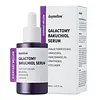What's inside
What's inside
 Key Ingredients
Key Ingredients

 Benefits
Benefits

 Concerns
Concerns

No concerns
 Ingredients Side-by-side
Ingredients Side-by-side

Water
Skin ConditioningCaprylic/Capric Triglyceride
MaskingPropanediol
SolventGlycerin
HumectantTocopherol
AntioxidantAscorbyl Glucoside
AntioxidantBakuchiol
AntimicrobialSolanum Melongena Fruit Extract
Skin ConditioningCurcuma Longa Root Extract
MaskingOcimum Basilicum Flower/Leaf Extract
TonicCoccinia Indica Fruit Extract
Skin ConditioningAloe Barbadensis Flower Extract
EmollientMelia Azadirachta Flower Extract
Skin ConditioningMelia Azadirachta Leaf Extract
Skin ConditioningOcimum Sanctum Leaf Extract
Skin ConditioningMarrubium Vulgare Extract
Skin ConditioningCorallina Officinalis Extract
Skin ConditioningSimmondsia Chinensis Seed Oil
EmollientXanthan Gum
EmulsifyingSodium Levulinate
Skin ConditioningPotassium Sorbate
PreservativeSodium Benzoate
MaskingCitric Acid
BufferingWater, Caprylic/Capric Triglyceride, Propanediol, Glycerin, Tocopherol, Ascorbyl Glucoside, Bakuchiol, Solanum Melongena Fruit Extract, Curcuma Longa Root Extract, Ocimum Basilicum Flower/Leaf Extract, Coccinia Indica Fruit Extract, Aloe Barbadensis Flower Extract, Melia Azadirachta Flower Extract, Melia Azadirachta Leaf Extract, Ocimum Sanctum Leaf Extract, Marrubium Vulgare Extract, Corallina Officinalis Extract, Simmondsia Chinensis Seed Oil, Xanthan Gum, Sodium Levulinate, Potassium Sorbate, Sodium Benzoate, Citric Acid
Galactomyces Ferment Filtrate 95%
HumectantNiacinamide
SmoothingBakuchiol
AntimicrobialPanthenol
Skin ConditioningCollagen
Moisturising1,2-Hexanediol
Skin ConditioningHydroxyacetophenone
AntioxidantSimmondsia Chinensis Seed Oil
EmollientTocopheryl Acetate
AntioxidantPropanediol
SolventButylene Glycol
HumectantCentella Asiatica Extract
CleansingCarbomer
Emulsion StabilisingAlgin
MaskingCeramide NP
Skin ConditioningCannabis Sativa Seed Extract
EmollientAdenosine
Skin ConditioningGeranium Maculatum Oil
MaskingGalactomyces Ferment Filtrate 95%, Niacinamide, Bakuchiol, Panthenol, Collagen, 1,2-Hexanediol, Hydroxyacetophenone, Simmondsia Chinensis Seed Oil, Tocopheryl Acetate, Propanediol, Butylene Glycol, Centella Asiatica Extract, Carbomer, Algin, Ceramide NP, Cannabis Sativa Seed Extract, Adenosine, Geranium Maculatum Oil
Ingredients Explained
These ingredients are found in both products.
Ingredients higher up in an ingredient list are typically present in a larger amount.
Bakuchiol is a plant-derived antioxidant (it's vegan!). It is often called the replacement for retinol although it is not part of the same family.
It has similar effects as retinol: skin smoothing, reducing discoloration, and preventing wrinkles. It does not cause as much irritation as traditional retinoids.
Bakuchiol works by breaking down free radicals and stimulating collagen production in skin.
Combining bakuchiol with retinol will not have adverse side effects. Studies show using them will just boost the benefits. Bakuchiol is also found to help stabilize retinol.
While bakuchiol does not make the skin more sun sensitive, we recommend wearing SPF on a daily basis.
Read more about traditional retinol
Learn more about BakuchiolPropanediol is an all-star ingredient. It softens, hydrates, and smooths the skin.
It’s often used to:
Propanediol is not likely to cause sensitivity and considered safe to use. It is derived from corn or petroleum with a clear color and no scent.
Learn more about PropanediolThis oil comes from the seeds of the desert shrub called Jojoba. It is more commonly known as jojoba oil, a non-comedogenic oil.
Jojoba oil does not contain fragrance and has many fatty-acids, making it a great soothing ingredient.
It also contains Vitamin E, a great moisturizing ingredient. Vitamin E is also an antioxidant and protects your skin against oxidative damage.
This ingredient humectant properties, meaning it helps draw moisture from the air. This helps keep your skin hydrated.
While jojoba has antibacterial properties, it is only able to kill some strains of bacteria.
Studies also show it helps in wound healing. In fact, Indigenous cultures have used jojoba as a moisturizer and to help treat burns for centuries.
Fun fact: Jojoba oil similar to natural human skin sebum, so it has a great effect on dry skin. It is also promising with helping to regulate sebum production.
Due to its fatty acid content, Jojoba oil may not be fungal acne safe. We recommend speaking with a professional if you have any concerns.
Learn more about Simmondsia Chinensis Seed Oil